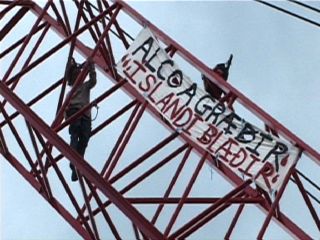By Jaap Krater
Last spring ALCOA released the first draft of the joint environmental impact assessment for the proposed Bakki smelter and power plants at Krafla and Theistareykir. Recently Iceland’s National Planning Agency commented on the draft assessment in a damning commentary.
The agency stated that the environmental impacts of the project are high and cannot be mitigated. 17,000 ha of untouched wilderness will be affected. Greenhouse gas emissions of the project would constitute 14% of Iceland’s total. There is a great deal of uncertainty on the full impact of the planned power plants and particularly on how much geothermal energy can be sustainably produced. Finally, the assessed energy projects will not be able to fully power the smelter, with 140 MW of capacity missing.
This confirms three key points of critique on the smelter that we have been voicing for several years now.
Firstly, the environmental impact of the geothermal plants and drilling in the north is much greater than Alcoa has claimed.
Secondly, we have said that carbon emissions from the projects would be so high that Iceland would find it extremely difficult to meet its international obligations. If Iceland wishes to become an EU member, then this impact assessment will surely be the kiss of death for the Bakki project.
Thirdly, when the joint impact assessment was announced we insisted that possible dams in Skjalfandafljót, Jökulsá Eystri, Jökulsá Vestri and Jökulsá á Fjöllum (a 72 km2 reservoir is on the drawing boards!) should be assessed for environmental impact, because one or more of them would be needed for a 346.000-ton smelter.
Now our calculations, that the northern geothermal fields will not produce enough energy for the smelter, have been proven correct. The original proposal for the smelter was for 250.000 tons, but ALCOA have stated in international media that they intend to extend the Bakki smelter to 500.000. Whether or not this will happen, new dams need to be built if the smelter is pushed through. This will lead to a large amount of borrowing and capital inflow that will again destabilise the Icelandic economy, which is too small to deal with projects this size.
Saving Iceland’s energy calculations were published in Morgunblaðið (22 August 2008), and greenhouse gas calculations were published in an international book publication on green energy and on savingiceland.org. Other environmentalists in Iceland have also raised these issues.
However, Alcoa and the consecutive Icelandic governments have thus far ignored them.
They refuse to comment on where the required energy is going to come from.
They refuse to think about how the economy will respond to more huge projects.
They refuse to comment on how Iceland can keep its green and unspoiled reputation if so much of its landscape and rivers will be ruined and if greenhouse gas emissions sky-rocket.
They now even refuse to respond to the national planning agency, except that they have said they will simply ignore the environmental impact.
We hoped that this kind of arrogance had been gotten rid of by the fall of the government in 2009 but apparently it is still there.
Clarity and transparency is for a start needed now on this simple question: if there is going to be a 346.000-ton or more smelter at Bakki, where will the new dams be built?
References:
Development of Iceland’s Geothermal Energy Potential for Aluminium Production – A Critical Analysis
Sparking a World-wide Energy Revolution: Social Struggles in the Transition to a Post-Petrol World. Editor: K. Abrahamsky. AK Press, 2010.
Jaap Krater is an ecological economist and a spokesperson of Saving Iceland
This article was first published in Morgunblaðið March 5 2011.

Hear hear!! Big parallels with the current situation in Greenland where democracy and transparency have given way to Alcoa’s PR campaigns and pay offs. The Icelandic state needs to wake up to the fact that it is being exploited as a small and vulnerable country by Alcoa. The deal being offered is an insult, not only in the economic short term but also in the ecological (and economic) long term.
All power to your elbows!!